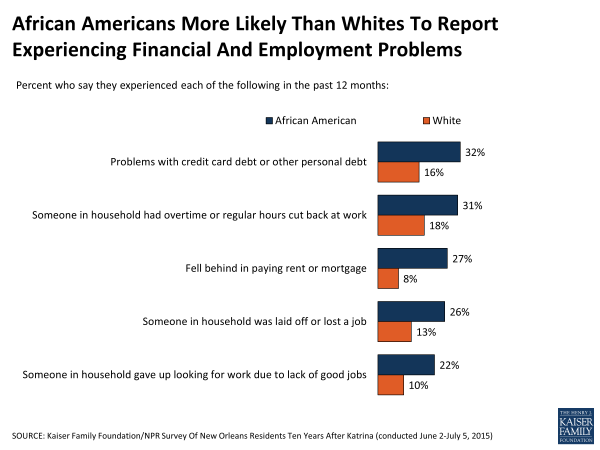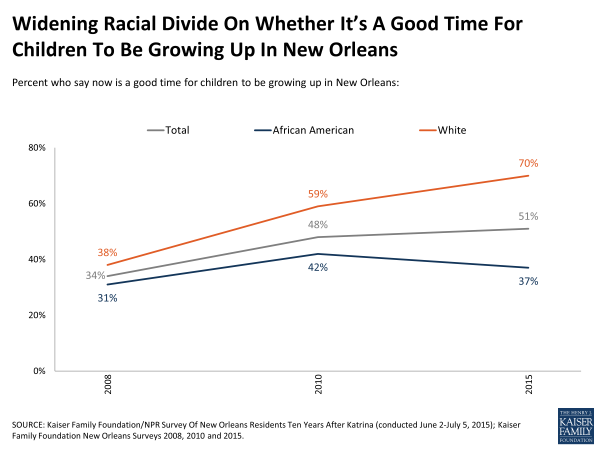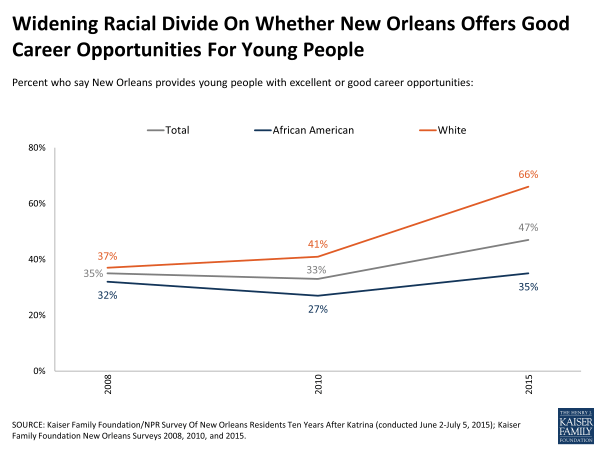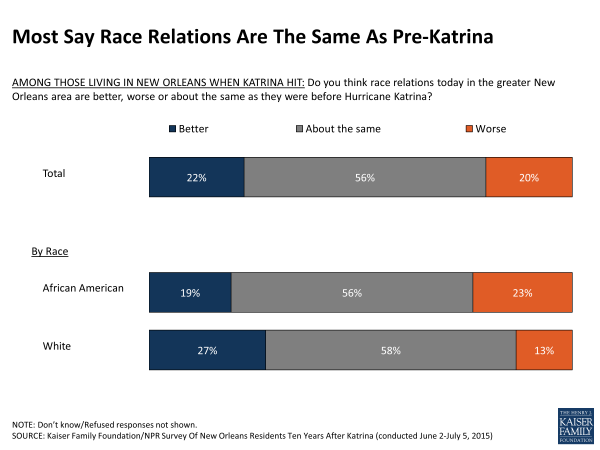New Orleans Ten Years After The Storm: The Kaiser Family Foundation Katrina Survey Project
Section 2: Racial Disparities
Disparities In Economic Circumstances
The sense that New Orleans’ African American residents have been left behind by the recovery efforts may be exacerbated by the fact that these residents were living substantially different economic realities from their white counterparts long before Hurricane Katrina hit, and continue to do so today. A recent report found that the median household income for African Americans in New Orleans was 54 percent lower than for area whites, and 20 percent lower than for African Americans nationwide. Similarly, while employment rates for white men in New Orleans were on par with other fast-growing Southern metro areas, the employment rate for black men – at 57 percent in 2013 – lagged behind similar cities.1
Those differing circumstances are reflected in the survey findings when it comes to reports of specific financial troubles. For example, African Americans are more likely than whites to say that in the past year, they have had problems with credit card debt or other personal debt (32 percent, compared to 16 percent), had hours cut back at work (31 percent, compared to 18 percent), fallen behind in rent or mortgage payments (27 percent, compared to 8 percent), been laid off or lost a job (26 percent, compared to 13 percent), or given up looking for work because of a lack of good jobs (22 percent, compared to 10 percent).
Uneven Progress In Perceptions Of Recovery
As noted above, the share of New Orleans residents overall who say the city has mostly recovered from Hurricane Katrina has increased substantially since 2010. However, a large racial gap underlies this overall positive trend. While fully seven in ten whites now say the city has mostly recovered, just 44 percent of African Americans say the same, leaving a majority of African Americans (54 percent) saying that the city has not yet fully recovered.
African Americans are also more likely than whites to think that if Hurricane Katrina were to hit the Gulf Coast today, the levees would be breached again (41 percent, compared to 28 percent). This concern may reflect the fact that African Americans are more likely to live in neighborhoods that are at the highest risk for flooding if another big storm hits, including New Orleans East, Gentilly, and Algiers.
| Table 3: African Americans Less Likely To Say New Orleans Has Recovered From Katrina, More Likely To Worry About Future Levee Breaches | |||
| Total | African Americans |
Whites | |
| Overall, would you say New Orleans has mostly recovered from Hurricane Katrina or not? | |||
| Yes, has recovered | 54% | 44% | 70% |
| No, has not recovered | 43 | 54 | 28 |
| Don’t know/Refused | 2 | 2 | 1 |
| If Hurricane Katrina were to hit the Gulf Coast today, do you think the New Orleans levees would hold, or do you think they would be breached again? | |||
| Levees would hold | 53 | 49 | 62 |
| Levees would be breached | 36 | 41 | 28 |
| Don’t know/Refused | 11 | 10 | 10 |
Widening Racial Gaps On New Orleans As A Good Place For Young People
One of the more troubling trends identified by the survey is a widening of the racial gap in perceptions of New Orleans as a good place for young people. Seven in ten whites (70 percent) now say it’s a good time for children to be growing up in New Orleans, a proportion that has risen steadily since 2008. By contrast, fewer than four in ten African Americans agree, while a majority (57 percent) of African Americans say now is a bad time for children to be growing up in the city. This negative view is even higher among African American parents, 68 percent of whom say it’s a bad time for children to be growing up in New Orleans.
Similarly, while the share of residents overall who say New Orleans provides excellent or good career opportunities for young people has increased over time, this trend is driven mainly by the increasingly positive views of whites. Two-thirds (66 percent) of whites now hold this view, up 29 percentage points since 2008, while just 35 percent of African Americans agree, about the same proportion who felt this way 7 years ago.
Despite these widening racial gaps in attitudes and continuing economic disparities, and despite the fact that other polls have found a recent worsening in perceptions of race relations nationally2, a majority (56 percent) of residents who’ve lived in New Orleans since before the storm say race relations in the city are about the same as they were pre-Katrina. This view is held by a majority of both African Americans and whites. However, for those who see a change in race relations, whites are more likely to say things are better today than before the storm (27 percent better versus 13 percent worse), while Africans Americans are more divided (19 percent better, 23 percent worse).




